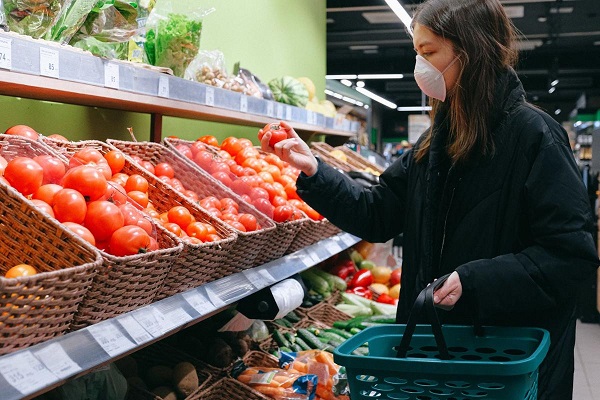06/08/2020
State of Cleveland Food Community During Pandemic Discussed
- Share This Story

Photo by Anna Shvets from Pexels
Article reprinted with permission from Cleveland Jewish News
by BECKY RASPE | STAFF REPORTER
As the COVID-19 pandemic presses on, the Cleveland restaurant community is beginning to understand the real impacts of closures and the fear of going out even after restrictions have been lifted.
The Jewish Federation of Cleveland’s Young Leadership Division held a one-hour Zoom networking event on May 27, “The Cleveland Food Industry: The Impact of COVID-19,” where local culinary professionals discussed the impact on Cleveland’s food industry. The panelists were: Aaron Saltzman of Dave’s Supermarket and Lucky’s Market Cleveland; Jeremy Umansky of Larder: A Curated Delicatessen & Bakery in Cleveland; and Rachel Zuchowski of Tibor’s Kosher Meats in University Heights. About 60 people watched the event, which was moderated by two business networking co-chairs, Jeff Heller and Faige Margareten.
With some questions prepared by YLD and others taken from the audience, the professionals shared insight into how business has been during the pandemic and the changes put in place to keep everyone safe.
Following the widespread opening of culinary establishments, Heller asked the professionals what customers could expect coming back.
Zuchowski, sister of Tibor’s Kosher Meats owner Ilan Senders, said Plexiglass has been installed at the deli and cashier counters. Sanitizing stations have also been installed, but customers shouldn’t be worried about the level of cleanliness from employees. Before the pandemic, she said safety and cleaning protocols were already observed.
“Most customers wear masks, and we are also trying to not let children into the store and that has been mostly working fine,” she said. “Because the store is small, we’re just keeping a close eye on how many people are allowed inside the door.”
She added customers have also been placing orders through email, picking up from the counter, or doing curbside. Local delivery is also available, as well as shipped orders, but costs can get high to keep products fresh when shipped overnight.
Umansky, who operates Larder alongside his partners, wife Allie La Valle-Umansky and Kenny Scott, said everyone had already been following regulations at his establishment. Larder was closed for three weeks during the stay-at-home order and recently reopened. However, its dining room is closed for the foreseeable future.
“Our standpoint of dealing with COVID is no different,” he said. “We already have these stringent rules in place. We want to make sure that people in the Cleveland community know that whether it is our businesses or others, all of these places are being monitored. People should feel comfortable knowing that is happening.”
Saltzman shared Dave’s Supermarket has focused on how they operate during the pandemic, concerning being there for both the customers and employees and ensuring the product is always on the shelves. His family recently purchased Lucky’s Market Cleveland on the west side.
“From the grocery story perspective, this is a time we have never seen before,” Saltzman said. “We as a business have stayed open throughout and we found ourselves as a business making decisions in minutes and hours that might have been decisions we would’ve made over weeks. For any business that is getting back online or finding a path from here, taking that information and finding the best ways to communicate it through your organizations, that is critical.”
Heller then asked the professionals about supply chain issues.
“I think there is something for everyone to understand from the means of a grocery example of how the economy at large has been impacted and how so many different channels affect one another,” Saltzman said. “So many different channels are doing their best to keep their teams safe and getting products where they need to go, but have also found challenges within themselves.”
Umansky added, “Largely what we’re starting to see is the true cost of food come forward. While there is plenty of product in the market, it is coming into the market much slower. Producers are going through the same things we are. We’re seeing some costs go up – like for our brisket, it was $3 to $4 a pound, and now it’s $7, so it has doubled. But we haven’t passed that onto our consumers yet. But, there are going to be some shakeups on that level.”
Zuchowski said those issues within the supply chain, especially with raw meat, have affected kosher establishments. As non-kosher grocers and restaurants closed, getting kosher meat can be harder.
“When they slaughter the cow, some of the meat goes for kosher and some goes for non-kosher,” she said. “If the non-kosher parts aren’t being bought by the food industry, they think, ‘What is the point if all of this is going to waste, we’re not going to do it.’ That is where this has affected us.”
Near the end of the discussion, each panelist shared their best advice for current industry professionals and how to weather the pandemic.
“I’d recommend following your instincts and values in making sure where decisions are made that those decisions reflect what you stand by,” Saltzman said.
Zuchowski said, “Do your best and reach out to people for help if you need it and keep the hope alive that we’ll all get through this and everyone will be able to sustain and come out the other end and rebuild from here.”
Umansky added, “My advice is you have to take action. Stay positive, hopeful and trudge on. As a business owner, you work so hard to build something and you should keep working hard to sustain that.”
Jewish Federation of Cleveland’s Emergency Food Response:
Those who have questions about resources offered for the Jewish community are encouraged to call the Jewish Federation of Cleveland’s confidential information and referral helpline, Access Jewish Cleveland, at 216-292-4636, or email info@jcfcleve.org or visit jewishcleveland.org.

